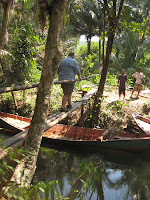

Lonely Planet describes Krong Koh Kong as a wild west frontier town, full of smugglers and dodgy hotels. Fortunately with Malcolm, the Welsh owner of 'Fat Sams bar' to guide us,we found a charming town full of entrepreneurs. As with everywhere else there was moto and tuk tuk chaos, a strip of tarmac for road and dubious drainage. Not being able to avoid farm visits any longer, we took a boat and had a trip up river into the mangrove forest on the southern edge of the Cardamon mountains. Taking a random selection of Malcolm's friends and guided by Noy we followed the jungle paths and saw small farms producing fruit, sugar cane, lemon grass (50 cents/kg) and Sandlewood. One progressive farmer was growing 4 ha of water melons, all without irrigation just relying on the heavy forest dews. We saw a lot of hammocks and mosquitoes but not much bird life, rumour has it that all the birds have been eaten and after trying the local spider delicacies at Skoun i can quite believe it.
The forest seem
Noy farms 5 ha's and told us how

After such thirsty farm visits the rest of the day revolved round paddy's bar where the toilets are unmentionable but the food is excellent (try the noodles they are amazing), I began to think that Cambodian farming may be more fun than we first thought.
No comments:
Post a Comment